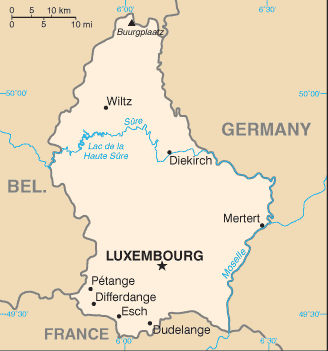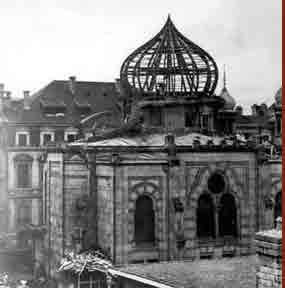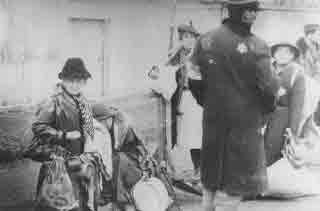Luxembourg Virtual Jewish History Tour
by Joanna Sloame
 |
Luxembourg was founded in 963 CE by Count Siegfried and the first record of Jews living in the city of Luxembourg, the capital of the country, was in 1276. Today, approximately 600 Jews live in Luxembourg.
Earlyu History
Holocaust Period
Rebuilding a Community
Relations with Israel
Jewish Tourist Sites
Early History
Luxembourg was founded in 963 CE by Count Siegfried, and the first record of Jews living in the city of Luxembourg, the capital of the country, was in 1276. In the early 14th century, small numbers of Jewish immigrants from the adjacent area of Trier, founded settlements in Luxembourg.
During the Black Death of 1349, Jews were massacred or expelled from the cities of Luxembourg and Echternach. The complete expulsion of the Jews occurred in 1391, but, by 1405, a few Jews had already moved back into the region. In a 1478 uprising, Jewish homes and property were pillaged and destroyed, prompting the exodus of all but two Jewish families.
By 1515, 15 Jewish families lived in Luxembourg, Echternach, and Arlon. The Jews were again expelled in 1530, save some Marranos. Jews did not reappear in Luxembourg until the Napoleonic Era.
In 1808, 75 Jews resided in Luxembourg. The country gained its independence in 1815, and the first synagogue was built in 1823. The country's first chief rabbi, Samuel Hirsch, was appointed in 1843 and served until 1866. By 1880, there were 87 families, or 369 persons in the city of Luxembourg, and 63 families spread throughout the duchy. This growth led to the creation of a new synagogue in the city of Luxembourg in 1894, and another in Esch-sur-Alzette in 1899.
By 1927, the Jewish community had grown to 1,171, and was augmented further by the immigration of refugees from Germany. By the 1930s, the population had reached nearly 4,000 persons.
The Holocaust Period
Neutral Luxembourg was invaded by Germany on May 10, 1940. The Nazis were met with little resistance and were aided by local Volksdeutsche, ethnic Germans. At this time, more than 1,000 of the duchy's 4,000 Jews, including approximately 1,000 refugees, escaped to France and Portugal. Luxembourg came under a German military government beginning in early May until August 1940. Rabbi Serebrenik created a consistory to represent the Jews.
On August 2, 1940, a Nazi civil government under Gauleiter Gustav Simon was set in place. A month later, the Nuremberg Laws were introduced to Luxembourg. On September 5, 355 businesses were taken from the Jews and given the "Aryans." On September 13, the Gestapo announced that all Jews must leave the country or face deportation on the following Yom Kippur. This measure was postponed, but the only way for the Jews to survive Hitler's regime was to flee. Between August 8, 1940, and May 26, 1941, 700 Jews fled overseas, including Rabbi Serebrenik. In a secret operation, 1,000 Jews were evacuated to the unoccupied zone of France. The consistory became the Aeltestenrat der Juden and oversaw the 850 Jews still living in Luxembourg.
Jewish restrictions followed, including the requirement in September 1941, that all Jews wear a badge with a yellow star with the word "Jude" on it. On October 13, the Aeltesternrat der Juden stated that 750 Jews remained in the country, 80 percent of whom were over the age of 50. The Jewish community was interned by the German authorities in the Fuenfbrunnen transit camp near the city of Ulfingen in northern Luxembourg. Of these Jews, 127 managed to emigrate in January 1942. By October 15, when the Germans stopped allowing Jews to emigrate, more than 2,500 had left the country, mostly for France. However, most of these refugees were later deported from France to concentration camps in Poland.
On October 16, the first convoy of extermination camp-bound Jews left for Lodz, with 324 persons aboard. In eight more transports, the last of which left on September 28, 1943, another 350 Jews were deported to other camps, to Lodz, Auschwitz, and Theresienstadt. Luxembourg was officially Judenrein, or cleansed of Jews, with the exception of a handful in hiding or married to non-Jews. But hiding was difficult and the chance of rescue small, due to the small size of the country and the large German population.
A small number of Christian Luxembourgers who helped save Jews during the Holocaust. Victor Bodson, the former Justice Minister and Chairman of the Luxembourg House of Representatives, rescued approximately 100 Jews trying to flee the Nazis. He risked his life to smuggle Jews out of the country through organized escape routes. For his valiant efforts, he was named Righteous Among Nations.
The Allies liberated Luxembourg on September 9, 1944. Only 1,555 of the 3,500 Jews who lived in the country in 1939 survived the Holocaust. The Nazis murdered 1,945, a third of whom died in camps after being deported from Luxembourg, and the rest in the country itself or in the occupied countries to which they fled. Only 36 Luxembourg Jews survived Nazi concentration camps.
Rebuilding the Jewish Community
After the Holocaust, approximately 1,500 Jews returned to Luxembourg, most of whom were merchants who rebuilt their prewar businesses. The government financially supported the reconstruction of the Jewish community, and helped build a new synagogue in 1953 to replace to old one destroyed in 1943. In Esch-sur-Alzette, a community of 40 families was established, and a new synagogue was built.
 |
The consistory was reestablished, with Edmond Marx as its leader, and contributed immensely to the Jewish rebuilding. The Consistoire Israelite is constitutionally recognized as the representative body of the Jewish community in Luxembourg. In 1959, Rabbi Emmanuel Bulz became the chief rabbi of Luxembourg. Maurice Levy became president of the consistory in 1961 and served until 1968, when Edmond Israel took over.
According to the official census, roughly 600 Jews live in Luxembourg today. Members of the community, however, believe that number could be twice as much. About eighty percent of Luxembourg’s Jews live in Luxembourg City, while there is a much smaller community in the nearby town of Esch-sur-Alzette. The Jewish population is made up of Jews who returned to the country after the Holocaust as well as some recent immigrants.
Since World War II until recently, the Jewish community in Luxembourg had kept a low profile, however today the community has begun to demand compensation for losses suffered during the Holocaust and has begun to raise awareness of Luxembourg’s unique history during the war. In 2002, the country set up a commission to look into the fate of material losses during the war. Of the twenty-five member commission, four are Jewish. While Luxembourg received 18 million Deutschmarks from Germany in 1959 to serve as compensation for the country’s Jewish community, only Luxembourg Jews were entitled to receive the reparations from Luxembourg’s government. Thus, foreign Jews living in Luxembourg have yet to be compensated for their losses.
Luxembourg has one kosher grocery store, Boulangerie Philip, which serves some thirty families who observe kashrut. Services at the main synagogue follow modern Orthodox ritual and are conducted in French and Hebrew by Moroccan-born Joseph Sayagh, believed to be the first Sephardic rabbi in Luxembourg history. Or Chadash, a small Reform congregation, was established in 1998 by Betty Preston, an American expatriate. The synagogue now has 35 adult members and 15 children, all expatriates. Or Chadash holds Shabbat services once a month at the local Baha’i Center and holds Rosh Hashanah services at the Hilton. A rabbi comes in from England each year to lead High Holiday services. There is no violent anti-Semitism in Luxembourg, however there is a presence of xenophobia.
Despite the small size and low profile of the Jewish community, some of Luxembourg’s Jews have achieved prominence. Alain Mayer, a former vice president of the community, is now a member of Luxembourg’s Council of State and Edmond Israel is a former president of the Luxembourg Stock Exchange.
Luxembourg refused to pay restitution to most of its Holocaust survivors for property they lost. Finally, in 2021, the government agreed to pay about $1.2 million “as a symbolic acknowledgement of support to Holocaust survivors from Luxembourg” and to “identify and restitute Holocaust-era dormant bank accounts, safe deposit boxes, and insurance policies through an independent audit.” The government will also provide about $30 million toward the construction of a Holocaust memorial and educational center at Cinqfontaines, a site where Jews assembled before being transported to death camps.
Relations with Israel
In November 1947, Luxembourg voted in favor of the partition plan to create a Jewish state. Israel and Luxembourg established full diplomatic relations in 1949. Due to Luxembourg's small size, the Israeli embassy is located in Brussels and Luxembourg is represented politically by the Dutch embassy and economically by the Belgian embassy.
Tourist Sites & Contacts
The Great Synagogue of Luxembourg-Orthodox
45 Av. Monterey
Luxembourg City, Luxembourg
Tel. 452-914Canal Synagogue
52 Rue de Canal
Esch-Sur-Alzette, LuxembourgOld Cemetery (Mid 1850s to late 1890)
Rue Jule Wilhelm (Passage de Treves)Or Chadash Liberal Jewish Community
42 rue du Kiem
Strassen, Luxembourg
Tel. 352 31 65 94Consistoire Israelite de Luxembourg
45 Avenue Monterey
2018 Luxembourg
Tel. 352 452 914, Fax. 352 473 772Chabad Lubavitch du Luxembourg
Rav Mendel Edelman
10, boulevard Royal L-2449 Luxembourg
Tel: +352 28 770 770
Email: [email protected]
Web: www.lubavitch.lu
Sources: Yad Vashem;
World War II Sites;
United States Holocaust Memorial Museum;
World Jewish Congress;
“Luxembourg,” Encyclopedia Judaica;
Cnaan Liphshiz, “In first, Luxembourg offers $1.2 million in symbolic compensation to noncitizen Holocaust victims,” JTA, (January 27, 2021).
Photo Credits:
Yad Vashem; United States Holocaust Memorial Musem




